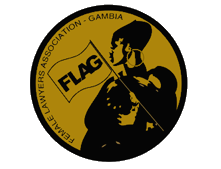Nationwide Mobile Legal Aid Clinic In Bansang (CRR).
FLAG’s Mobile Legal Aid Clinic arrives in Bansang like a moving beacon of justice, carrying hope, dignity, and the promise of protection to the heart of Upper Fulladu Constituency. The gathering begins with prayers and warm greetings, anchored by the presence of the Chief of Fulladu and guided by an introduction to FLAG’s mission.

With clarity and conviction, FLAG President Ms. Njie sets the tone, reminding the community that justice is not a privilege for the few but a right for every woman, every child, every voice long silenced.

What follows would be a powerful series of sessions that peel back the layers of SGBV from every angle.

Mr. Mass Laye confronts the harsh health realities of child marriage and domestic violence, accompanied with Q & A to deepen participants understanding of SGBV.
Participants asking questions.


This activity is supported by Clooney Foundation for Justice












